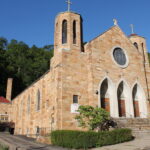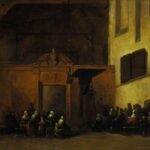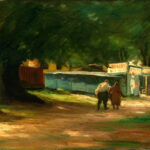Lean-framed, having changed his diet to deal with a heart condition, J.P. stands in the kitchen in the alcove of time between Sunday School and the morning service. Today he has a mustache. Next week he’ll not. A month from now he’ll have a beard. His blonde hair is thick yet on its ascension towards being entirely stone-wash gray. He wears his clothes fitted but not tight: blue jeans; usually a denim or flannel shirt, occasionally a polo, sometimes tucked in sometimes not. Though casual he isn’t sloppy or lazy; though blue-collared he isn’t unwashed. A fastidious, minimal air about him, he conjures up in my mind images of the American cowboy.
And his hands: his hands are corrugated wood pulp fibers.
A few cracks next to some of the fingernails. The valley between his forefinger and thumb seems dusted with ash. What did the hands of Jesus look like? J.P. holds a styrofoam cup full of black coffee, the steam ambling upward, content, like him, as a quiet offering.
An offering without words isn’t without import. The soul speaks even when the breath doesn’t thrum the vocal cords and find itself translated into audible, human speech. J.P. doesn’t say much, and when he speaks, he speaks in a low volume, unhurried, his mouth opening just enough for his words to reach the open air. Sometimes he gestures with his hands as he speaks. Sometimes the hand gestures take a wide arc, but the movements, like his words, neither rush nor fumble.
He talks of construction sites: schoolroom additions, courthouse remodels, elevator installments, whole facilities built from the ground up—like the Boy Scout Conference Center at The Summit Bechtel Reserve. He mentions weather conditions because he’s often in them, and he mentions the artifacts needed in cold, harsh temperatures: space heaters, hand-warmers, Carhart layers, thick socks, and boots.
Listening to J.P. provides a tour of his trade. It is not dissimilar from listening to a gardener, a coach, a doctor, a homemaker, an administrator, a student, an athlete, a financial advisor, a veteran. Consequently, the man in the church pew occupies the whole of existence, just as everyone else in the church does; and, like everyone else, the whole of existence with its physical and ethereal spheres follows him into the church house and out its doors. Heaven and earth are not mutually exclusive. The Word became flesh and dwelt among us, and we beheld him full of glory and grace. Coming to church remembers this. At least, it should. And a conversation with J.P. always helps.
Which is why another laborer, a lineman by the name of Josh, says he’s getting baptized. He’s almost fifty, but his gray-tinged black hair gives zero signs that it’s retiring. Like J.P., Josh wears jeans that fit. Sometimes he wears a pair of leather shoes that are twenty years old but still resolute. They are worn yet not worn out, much like Josh, whose handsome features belie his age. Josh undertakes long stretches of quiet labor. A quiet vocation, however, holds no less meaning among the myriads of people and their callings.
It’s his hands, though, much like J.P.’s hands, that prove his stories of working power lines for several decades up and down rural terrain in neighboring Virginia. His hands remind me of a topographical map. Even now with their nail scars, do Jesus’ hands bear also the marks that come with age and years as a craftsman?
Josh and I talked on a church pew just before the morning service; we discussed his decision to get baptized. He told me he’d been saved for years. “But there comes a time you gotta get serious,” Josh said.
A week or two after his baptism, I asked him if he’s ever seen the Robert Duvall movie Tender Mercies. “No. But I like Duvall,” Josh said.
“Duvall plays this drunk country music singer who gets saved,” I said. “He gets baptized, too. There’s a little boy riding home with Duvall after the service, and the boy asks Duvall, ‘You feel different?’ And Duvall says, ‘No.’” I asked Josh if he felt different.
“It’s crazy you bring that up,” he says. “I was away with my family and some family friends last weekend when someone asked me just that, about feeling different. And I said, no.”
But Josh has become a staple church member, quiet yet not closed off.
Away from church, he climbs the power line poles and works with few words. Among all those electrical currents that hum, in most weather conditions, Josh shows up for work as he shows up for church: faithful. “In cold weather I am foul,” Josh admits.
Along with Josh and J.P., the other congregants, and the Pastor, who can be counted on to be in church, whether they realize it or not, bear witness of heaven and earth, that we aren’t only material beings moving through the scouring sands of time until we ourselves are dust and ash, that we aren’t only spiritual beings biding our time until our bodies break open like a prison in an earthquake so we can fly into metaphysical dust and ash; rather, we are embodied souls, whose bodies bear marks that, when we attend to them, make visible the eternal soul and invisible sphere with which and into which we are engrafted. And those souls fitted for eternity, now, will find themselves wearing glorified bodies whose stories we will know, stories shored against their ruin because the Son of Man put on a human body so that we might put on a glorified body.
Image Credit: Albrecht Dürer







